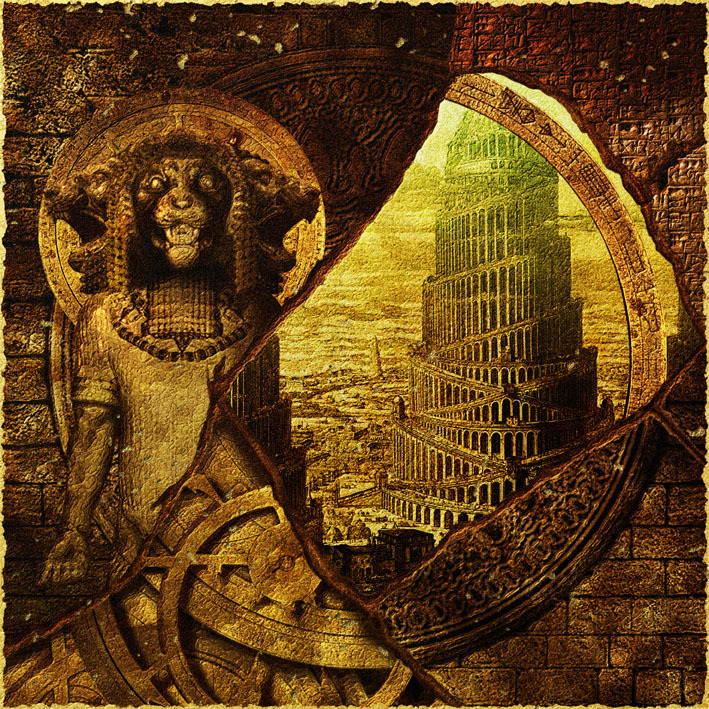Melechesh - Emissaries

Melechesh are a somewhat controversial band among black metal purists, as they incorporate so much diversity into their sound. As is so often the case, in an attempt to classify an almost completely original band, many professional reviewers have tried to come up a new term for them. The closest they've come up with is world metal, and much as I'm loathe to accept new genre titles for just one or two bands, it really is quite apt. You see, the whole raison d'etre for Melechesh's existence is the combination of black metal with traditional middle eastern music. This means that the music of Melechesh (which, incidentally, means "Lords of Fire" in Hebrew) is replete with middle eastern scaling and even the occasional passage or song completely without black metal elements (such as track 7 here, "The Scribes of Kur," performed entirely on traditional instruments) That's not to say that the guys from Melechesh aren't lacking in traditional black metal chops, though. It's taken me a very long time (about 2 years) to start to gain an appreciation for this particular sub-genre of heavy metal, but of late I've finally started to really get it, and it's immediately clear that Ashmedi and Moloch (aliases, naturally, this is still black metal) are extremely talented guitarists.
Despite, or perhaps because of, this unique approach to black metal, Melechesh gained a rapidly growing reputation and fanbase amongs the black metal scene following the release of their second album, Djinn. (Their first effort, As Jerusalem Burns...Al'Intisar was a much more standard black metal album and is not particularly worth searching out) This reputation only grew with the release of third album Sphynx, and naturally expectations were high for the release of Emmisaries, not least because this is the first album to feature new drummer Xul on drums, following the departure of black metal drum god Proscriptor of Texan band Absu. Now that I've given all this background, I'm sure the question is...are they actually any good? Is this album any good? The answer is unquestionably yes to the former, and even to people who would not consider themselves black metal fans (these guys were the ones who got me into the genre to whatever small degree I am) and a mixed yes to the latter. While the playing is tight and lyrics intriguing as ever, the style of production ha changed quite noticeably since Sphynx, emphasising the guitars and de-emphasising the bass. Ashmedi has chosen to go almost exclusively with his shrieky high pitched vocals for this album as well, whereas on past albums this has been balanced out by some growled vocals and greater use of chanting. There are still a few examples of the chanted vocals here, but they are fewer, and unfortunately much as the mix emphasises the guitars over bass, the vocals here are mixed much closer to the forefront of the music. To me, at least, this makes the album much more abrasive, and while the tracks are still good, it often becomes difficult to listen to straight through.
That might make me sound like I dislike the album, which isn't fair. Though this was the album that I first heard by Melechesh, and admittedly it did push me away after a while, there are still individually some extremely good songs, and much of the reason I was driven away for a time is that I just had this great sense of a lost oppurtunity. This album shoul have been their magnum opus, their master work, but the way that they went about it just muddied that for me. It's not been until I went back to their back catalogue that I've gotten into this album more, as I understand better where they're coming from.
The themes lyrically are similar to previous albums, but I've read that much of the lyrics were directly adapted from Ancient Mesopotamian, especially Sumerian, mythology (to those unfamiliar with the region's rich mythology, the earliest discovered written work, The Epic of Gilgamesh, was first written down in Sumeria about 4.5 thousand years ago) This certainly lends the band some real serious weight compared to the traditional silly fantasy themes in black metal.
At the end of the day, this is a good album, but compared to the band's earlier albums, it just lacks a bit. For those interested, I would point out Djinn as the best starting place, as it is a little less abrasive and easier to get into.
7.5/10
No comments:
Post a Comment